
MySST 2025 in Malaysia: Tax Rates, Exemptions & How to Calculate
Are You Hiring?
Find candidates in 72 Hours with 5+ million talents in Maukerja Malaysia & Ricebowl using Job Ads.
Hire NowMySST Malaysia, short for "Malaysian Sales and Service Tax," is a tax system designed to streamline taxation for businesses.
To replace the Goods and Services Tax (GST), MySST aims to create a simpler and more efficient tax framework for businesses while meeting government revenue needs.
If you are running a business in Malaysia, understanding SST is crucial to ensure compliance and avoid penalties.
This guide covers everything employers should know about MySST Malaysia 2025, including tax rates, exemptions, registration processes, and penalties.
What is MySST Malaysia?
MySST Malaysia refers to the Sales and Service Tax (SST) system implemented by the Malaysian government.
This tax system replaced the Goods and Services Tax (GST) in September 2018. It aims to streamline tax collection and make it simpler for businesses to comply.
The SST is divided into two parts:
-
Sales Tax: Charged on specific goods manufactured in or imported into Malaysia.
-
Service Tax: Applied to certain services provided within the country.
Unlike GST (Goods and Services Tax), which was a multi-stage tax, SST is a single-stage tax applied either at the manufacturing/importation level (for goods) or at the point of service (for services).
Who Pays SST in Malaysia?
The cost of SST is usually passed on to the customers.
This means that when you buy something or use a service, the price you pay already includes the SST.
So, in simple terms, customers are the ones who end up paying the SST, even though businesses are the ones responsible for collecting and sending it to the government.
Malaysia SST Rates for 2025
Malaysia's SST has different tax rates depending on the type of goods or services. Here’s an updated breakdown for 2025:
Sales Tax Rates:
-
5%: Applies to selected goods like petroleum oils, construction materials, watches, and some food products.
-
10%: The standard sales tax rate for most taxable goods, especially luxury or non-essential items.
Service Tax Rates:
-
8%: Applies to most taxable services except for a few categories.
-
6%: Covers food and beverage services, telecommunication services, parking, and logistics.
-
0% (Zero-rated): Applies to certain essential goods and services, meaning no tax is imposed.
Why is MySST Important for Employers?
MySST (Malaysia's Sales and Service Tax) is important for employers because it helps them manage their tax responsibilities easily and correctly.
In 2022, it accounted for 38.41% of RMCD’s revenue. Employers must use this system to ensure compliance with SST regulations.
Here's why it's crucial:
-
Tax Compliance: MySST ensures that employers pay the correct amount of sales and service tax, avoiding penalties and fines.
-
Streamlined Process: It simplifies tax filing by allowing employers to submit their taxes online, saving time and effort.
-
Transparency: MySST keeps all tax records clear, making it easier to track payments and any issues.
-
Avoiding Mistakes: Using MySST helps prevent errors in tax calculations, ensuring employers don’t overpay or underpay.
-
Legal Requirement: Employers must comply with MySST, as it is a legal requirement for businesses involved in sales or providing services.
Which Businesses Must Register for SST?
In Malaysia, businesses that sell goods or provide services need to register for the MySST (Sales and Service Tax) if they meet certain conditions.
-
Businesses with annual sales over RM500,000: If a business earns more than RM500,000 a year from selling goods or services, it must register for MySST.
-
Businesses that sell taxable goods or services: Even if a business makes less than RM500,000 but sells products or services that are taxable, they need to register.
-
Imported goods: If your business imports goods, you may also need to register for MySST.
However, small businesses making under RM500,000 in sales are not required to register, but they can choose to register voluntarily.
How to Register for MySST
It's important to note that the registration for sales tax and service tax are separate, each with its own submission process.
Here are the simplified steps for SST registration in Malaysia:
1. Visit the MySST portal
The government website dedicated to SST registration, at www.mysst.customs.gov.my
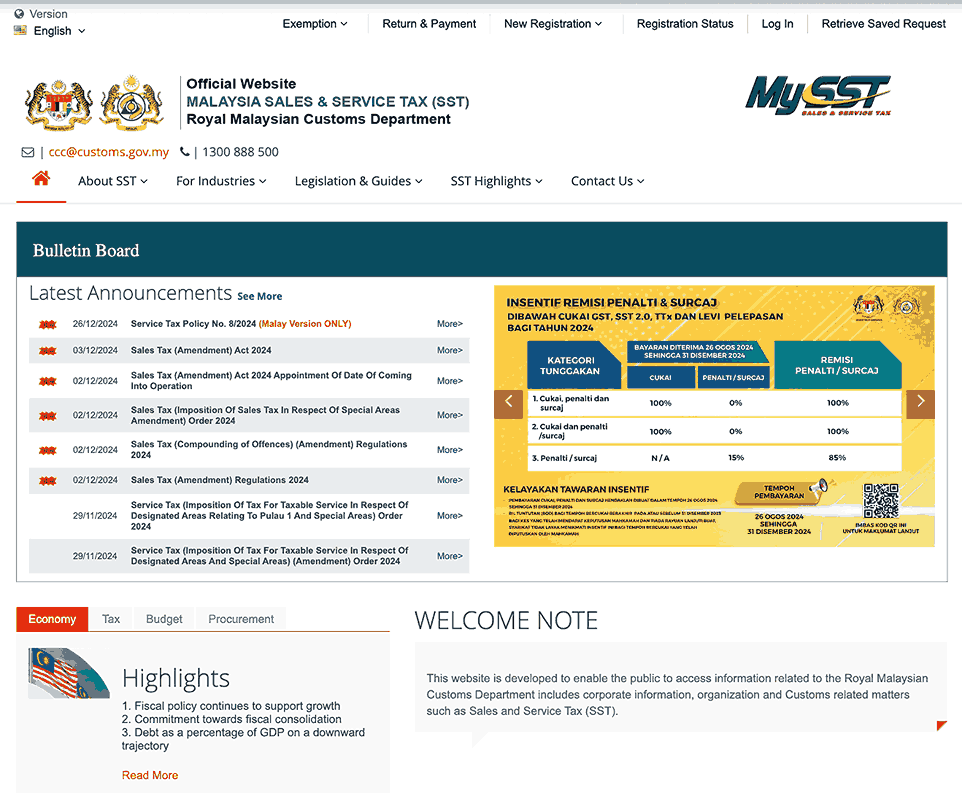
2. Click "New Registration" and Complete the Form
Hover to "New Registration" on the Top Navbar, and choose either Sales, Services, or Imported Tax.
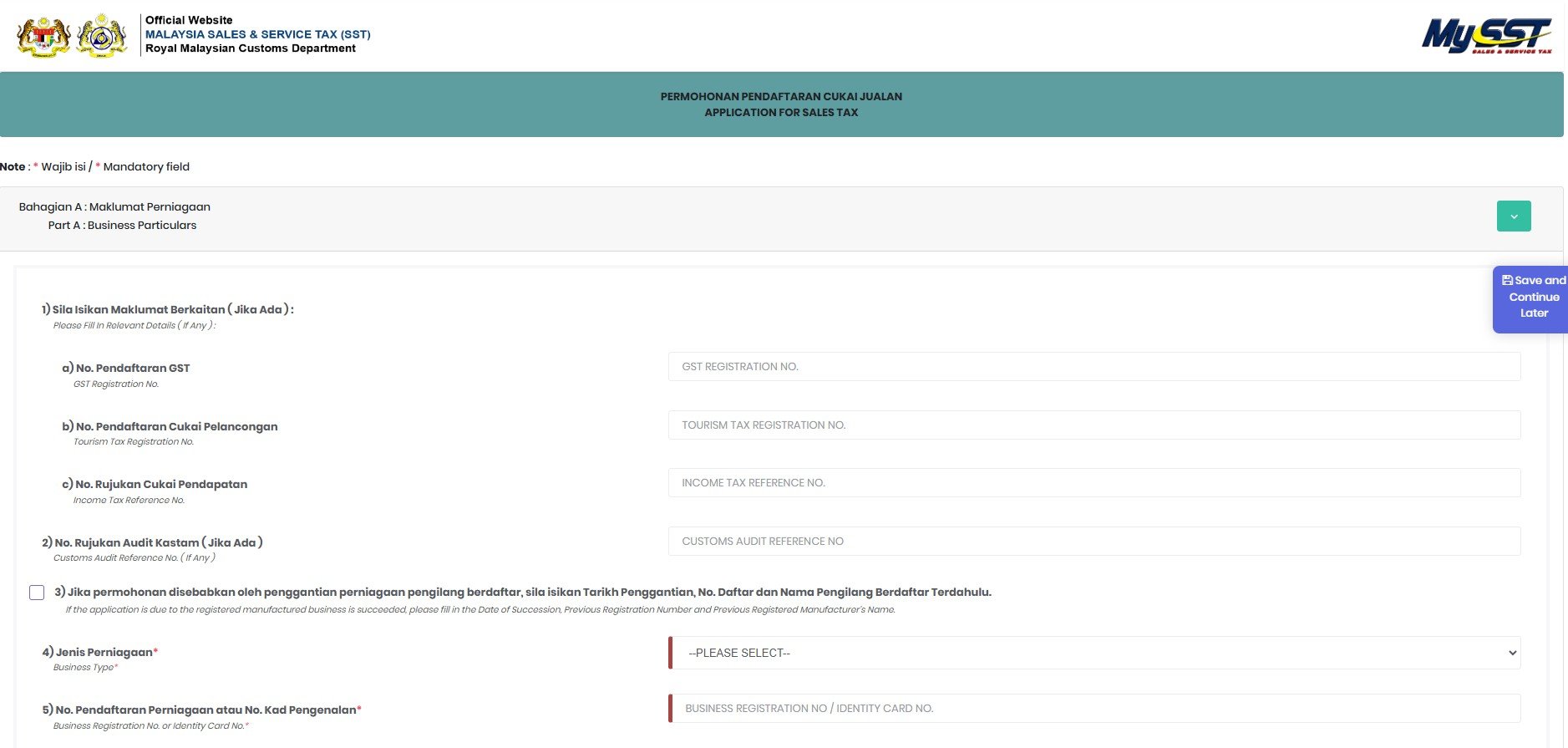
3. Receive an approval letter
Upon submission, you will receive an approval letter immediately, confirming the successful completion of the registration process.
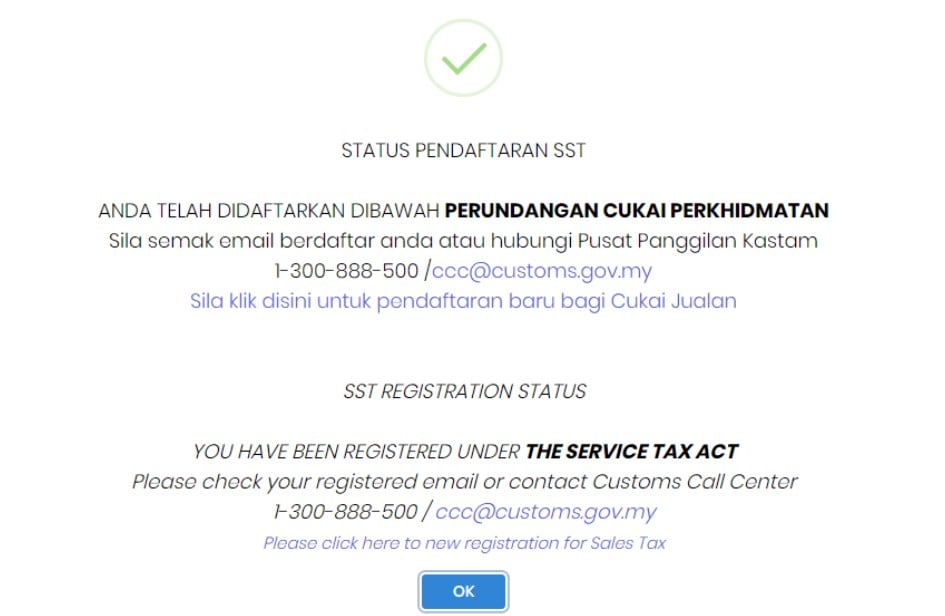
4. Obtain a sales tax registration number
The system will assign a sales tax registration number.
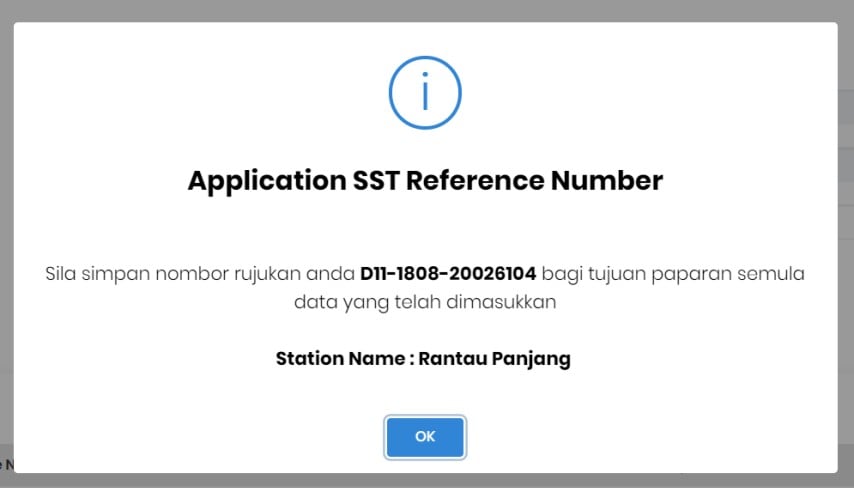
5. Check your email
If you are already registered for GST, you will receive an email from MySST with:
- A link to the MySST website
- Your User ID
- A temporary password to log in
- An approval letter
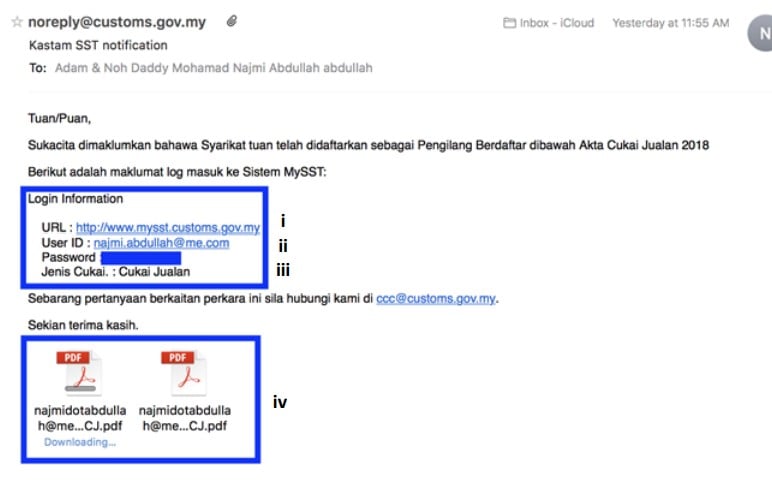
6. Check Registration Status
The Registration Status Tab allows users to check their registration status.
To do this, users need to select one of the options from the dropdown menu:
- GST Registration No.,
- Business Registration No. (BRN),
- Name of Business,
- or SST Registration No.
After selecting an option, they must enter the required information and click the Submit button.
If the registration exists, the details will be displayed. If not, a ‘No Record Found’ message will appear.
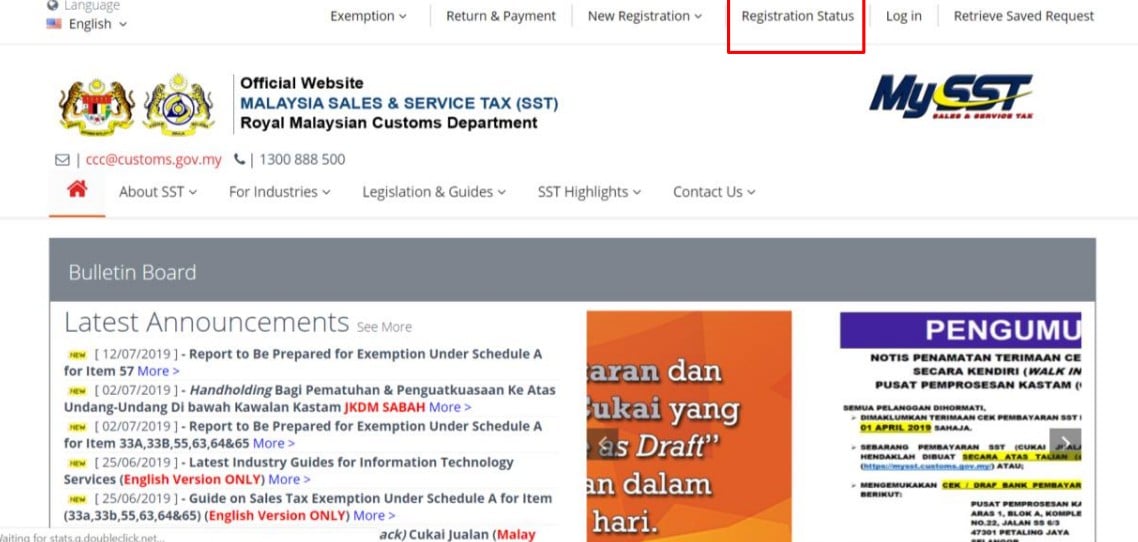
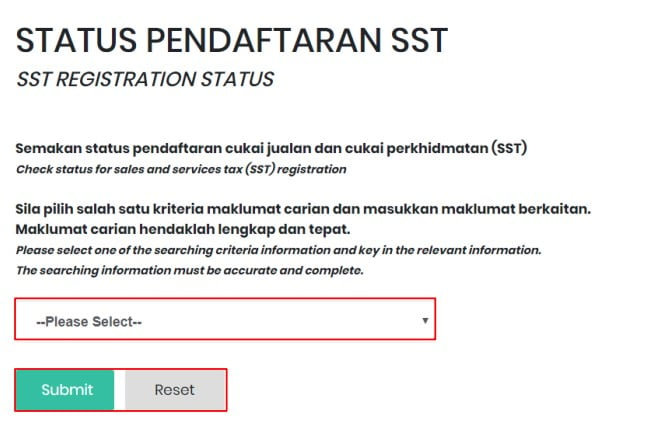

How to Calculate SST
1. Sales Tax Calculation
Example: If the selling price of a product is RM 1,000 and the sales tax rate is 10%, Sales Tax = RM 1,000 × 10% = RM 100.
If you are a manufacturer or importer, you need to apply the sales tax rate (10% or 5%) to the selling price of the goods.
2. Service Tax Calculation
Example: If the service fee is RM 500 and the service tax rate is 6%, Service Tax = RM 500 × 6% = RM 30.
If you are a service provider offering taxable services, you need to apply the service tax rate (6%) to the service fee.
Important Notes:
-
Exemptions: Some goods and services are exempted from SST.
-
Registration Threshold: Businesses with annual taxable sales or services exceeding RM 500,000 must register for SST.
-
Input Tax Credit: Unlike GST, SST does not allow for input tax credit, meaning businesses cannot claim back the tax paid on inputs.
What Goods are Exempted from Sales Tax?
Certain goods and services are exempt from SST to support essential industries and reduce consumer costs. Some key exemptions include:
-
Exported goods
-
Basic food items (e.g., rice, fresh vegetables, poultry)
-
Pharmaceutical products
-
Educational materials (e.g., books, newspapers)
-
Bicycles and essential medical equipment
These exemptions help businesses reduce operational costs while keeping essential products affordable.
Penalties for SST Non-Compliance
Failing to comply with SST regulations can result in hefty penalties. The main offences and penalties include:
1. Non-Submission of SST Returns
-
Fine: Up to RM50,000
-
Imprisonment: Up to 3 years, or both
2. Non-Payment of SST Dues
-
Fine: Up to RM50,000
-
Imprisonment: Up to 3 years, or both
3. Late Payment Penalties
-
1-30 days late: 10% penalty
-
31-60 days late: 15% penalty
-
61-90 days late: 15% penalty
-
Over 91 days: Maximum 40% penalty
Employers must ensure they submit SST returns and payments on time to avoid these penalties.
MySST Resources for Employers
To learn more about MySST, visit these resources:
Understanding and complying with MySST Malaysia is essential for employers.
By registering, filing accurately, and staying informed, you can avoid penalties and ensure smooth operations. Use the tips and resources in this guide to simplify your compliance process.
Are you Hiring in 2025?
Start hiring smarter with AJobThing today! Post your job ads, reach the best candidates, and simplify your hiring process using our user-friendly platform.
Read More:
- Malaysia Form E 2025: Submission Guide, Deadline, and Penalties
- Offer Letter: Definition, How To, and Free Templates
- PCB (Potongan Cukai Bulanan) in Malaysia: A Complete Guide for Employers
- Tax Reliefs in Malaysia 2025 for Employers: Types and How to Apply
- How to Pay SOCSO Online
- New EPF Retirement Savings: Helping Employers Support Financial Well-Being for Employees
- Can we retain staff over the age of 60 in Malaysia?
- Malaysian Employment Act 1955: Key Provisions Every Employer Must Know
- Malaysia National Registration Identity Card (NRIC): A Guide for Employers
- What is the TIN Number in Malaysia?
- Long Weekend 2025 List in Malaysia
- Public Holidays in Malaysia for 2025: Complete List and Dates

